After a cloudy and rainy day in Tucurui I continued my
tour in bright sunshine. It took me an hour and a half to get a lift
back to the place where I left my bike the other day.
As I open the window in the early morning I look into bright sunshine.
After two rainy days there are no more cloud to be seen, an absolutely
blue
sky. I pack my stuff and hurry out of the hotel.
It's rush hour in the jungle town, every few minutes a bus departs to
the
construction site on the river dam. I feel kind of out of place, I'm
the
only one in the overcrowded bus who doesn't wear blue working clothes
and
helmet. My presence serves as a welcome entertainment on the daily
routine.
From the last bus stop it's still a long walk and a short truck ride,
all
together it takes me one and a half hours to get back to the bar where
I
left my bike the other day.
"Oh, what a petty, you are back. I just wanted to sell your Bicicleta"
jokes
the nice owner of the bar, when I disturb his morning cleanup.
I ask if he already found someone to sell it to, but instead of an
answer I
he gives me a huge cup of Cachaça (the Brazilian type of rum), which
makes
it a difficult start at half past 7 in the morning.
I 'paid' the drink by leaving 2 or 3 kilos of food, noodles, rice and
soups,
as I already realized that I carry way too much. Therefore, I stocked up
my
water supply from 5 to 7 liters, which is enough for half a day or
so...
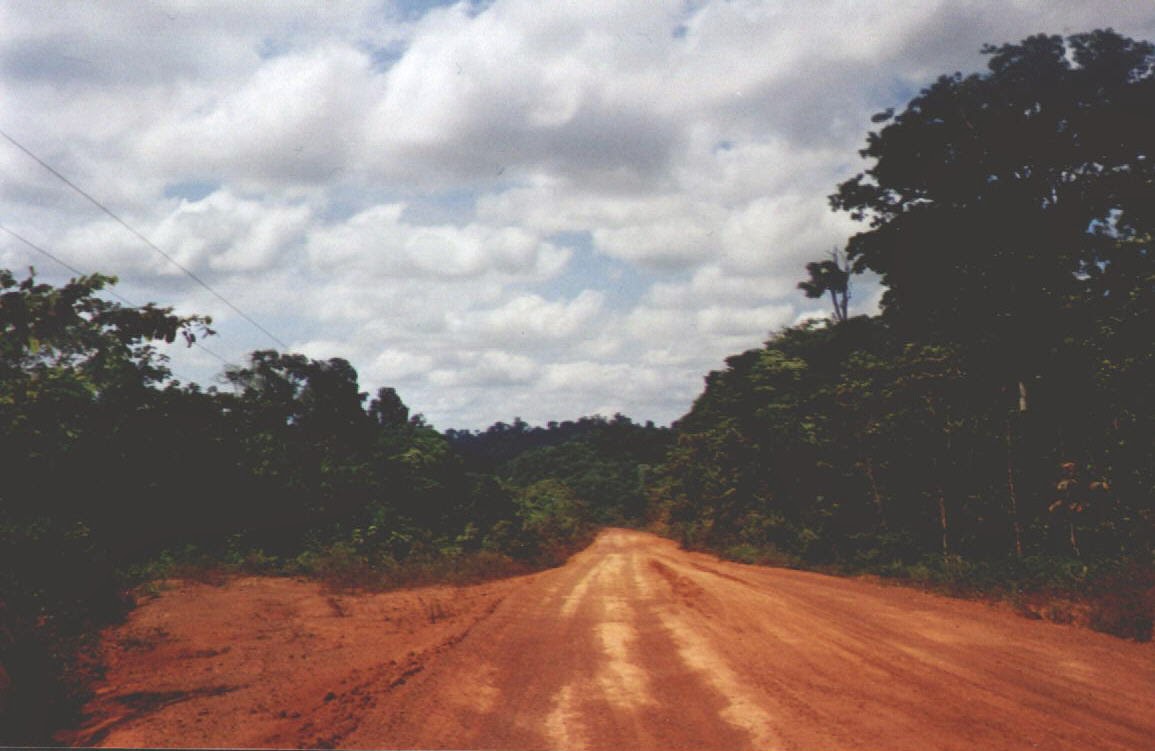
After a few minutes the town is out of sight. The next village, Novo
Repartimento, is approximately 70 kilometers to the south. "Novo"
(new),
because the old Repartimento disappeared in the waters of Lake Tucurui.
Nevertheless the inhabitants have been lucky, they have been relocated
before closing the dam. The natives who lived in that area have not
been
given that opportunity.
The road becomes more and more hilly, a constant up and down, mostly
through
uninhabited, native rainforest. Few vehicles use this 'shortcut', as it
is
much faster for the trucks to take another road down to Marabá, which
is 100
km longer, but on tarmac. That's why on the whole distance not more
than 3
vehicles pass by. And that is good for me, because the cloud of dust
emerging from a truck thundering by is enormous.
Occasionally smaller clearings appear, sometimes allowing a very nice
view
to the lake on the left, the rest is dominated by the green of the
forest.
The sun burned down, but I suffered less than the days before. Either
it's
better without the black
asphalt or I already got used to the heat.
The hills made it difficult to proceed. On the uphill part I often had
to
walk and on the downhill part I needed to pull the brakes as hard as I
could. I was not yet used to the dirt road and feared my bike would
brake
apart every minute.
In the afternoon I reached Novo Repartimento, and finally the BR230,
the
"official" Transamazônica.
There is not much sightseeing to do, the town seems to exist only to
supply
the trucks on the Transamazônica. It consists mainly of gas stations,
borracharias (tire repair shops) and basic restaurants. I have lunch in
one
of them, the usual, meat, rice, black beans and manioc flour, plus 2
beers
to celebrate the first 70 km on dirt.
In all of South America you won't find any bar or restaurant, not even
in
the most remote area, without a TV, and if there is electricity it will
run
on maximum volume. While I eat a soccer game is transmitted and the
restaurant is pretty crowded. The advantage for me is that I can
eat
in peace and do not have to answer a lot of curious questions, because
everything looks excited on the screen.
Only after the end of the game I am included into the discussions.
Which is
your favorite club and who will win this year's master cup, they want
to
know from me. Puuuuuh, perhaps I should have informed myself before
departure, I do not know anything about the current scores neither in
Brazil
nor in any other country. What a shame.
I now turned westward, and from here on there is much more traffic than
before. About every 5 to 10 minutes
a truck passed by, and each time I was covered with clouds of dust.
I spend the first night along the Transamazônica hiding in the woods.
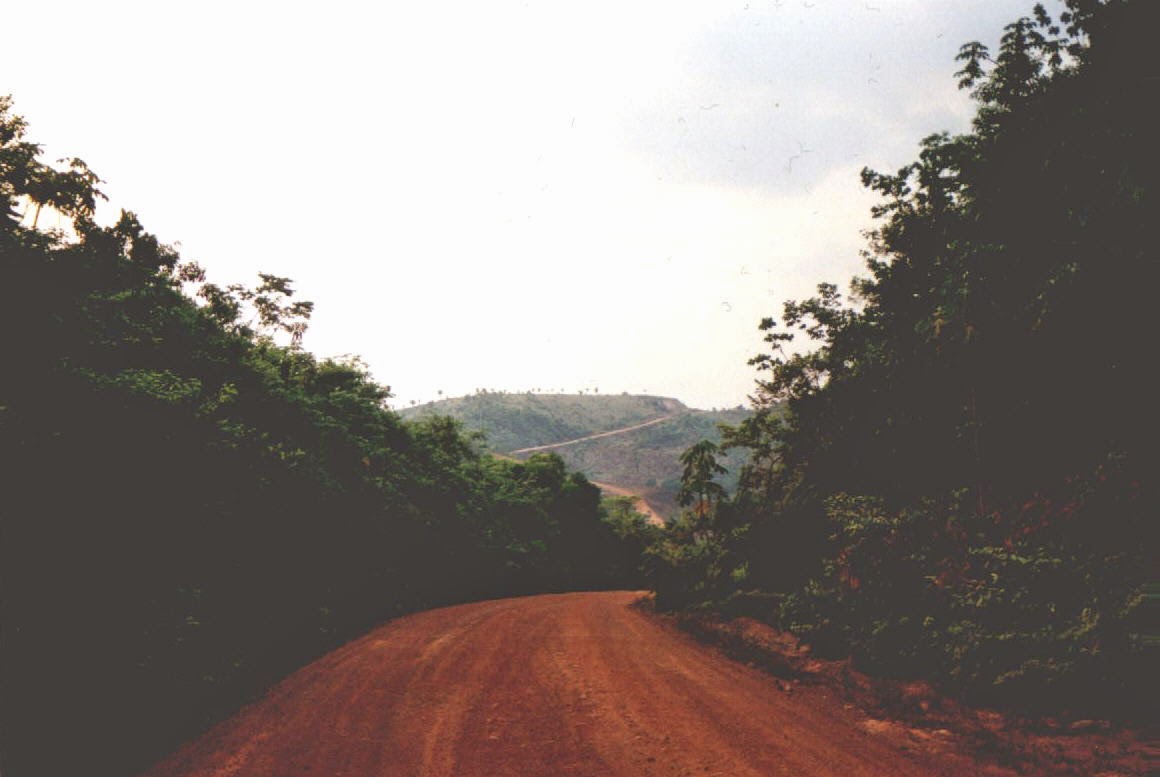
The next days continued much the same: Hills, hills,
hills. Where did people get that idea of the "flat Amazon basin" from?
The hills are not very high, something like 50, a maximum of 100 meters
but
they are incredible steep, some of them more than 20%, I guess.
The guy who planed this road was probably no cyclist. (Besides that,
the
trucks have a hard time, too, climbing and descending all this hills.)
The
road is winding a lot, and it seems as if the road turns right or left
in
each valley just to pick up the highest hill available. I don't know
why
they made it like this, the landscape is not flat, but I see no reason
to
climb that much.
I go like this: Walk uphill, take a short rest, mount the bike, cycle a
couple of meters on the flat hilltop, then pull your brakes as hard as
you
can on the downhill, because otherwise you won't come to a full stop
down in
the next valley. And you have to stop, because down there you usually
have
to cross any old wooden bridge, which is better to walk. No way to built
up
momentum for the next uphill.
I stop at each shadow available to cool down and to drink some of my
hot
water... Every 30 or 50 km I pass a bar, restaurant or even a small
town
where I could get food and, even more important, cold drinks. I drink
an
average of about 15 liters a day: 10 liters of water, the rest is Coke,
Fanta, Sprite, Guaraná and lot of ice-cold beer :-)
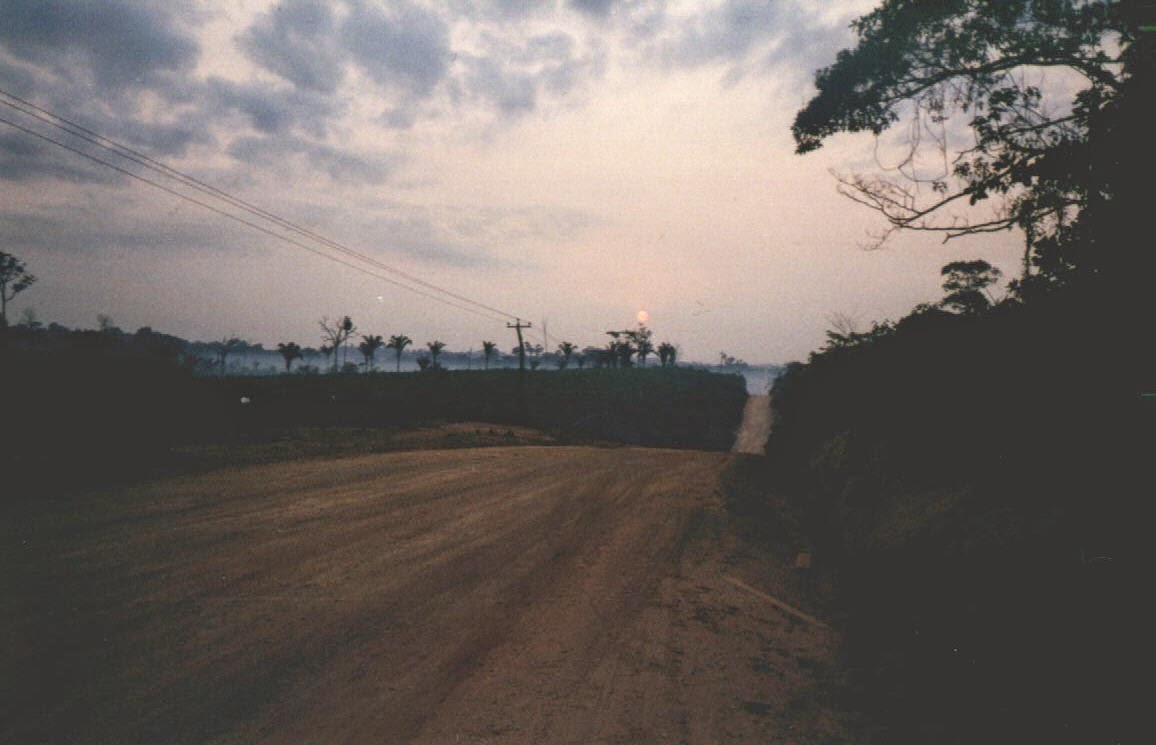
The landscape is marvelous: Small farms spread over green hills, with
all
kind of fruits, the dense rainforest is never more than 200 or 300
meters
off the road. In this part of Brazil the land is owned by small farms
that
usually cultivate all they need for their own survival. It's not the
big
fazendas I've seen before, where you cycle along the same plantation or
cattle ground for hours, with big parts of the soil already deforested
and
deserted and "Private property" or "No trespassing"-signs posted
everywhere.
Here it's really cycling through thousands of beautiful tropical
gardens,
and once in a while stretches of native forest transform the road into
a
green tunnel.
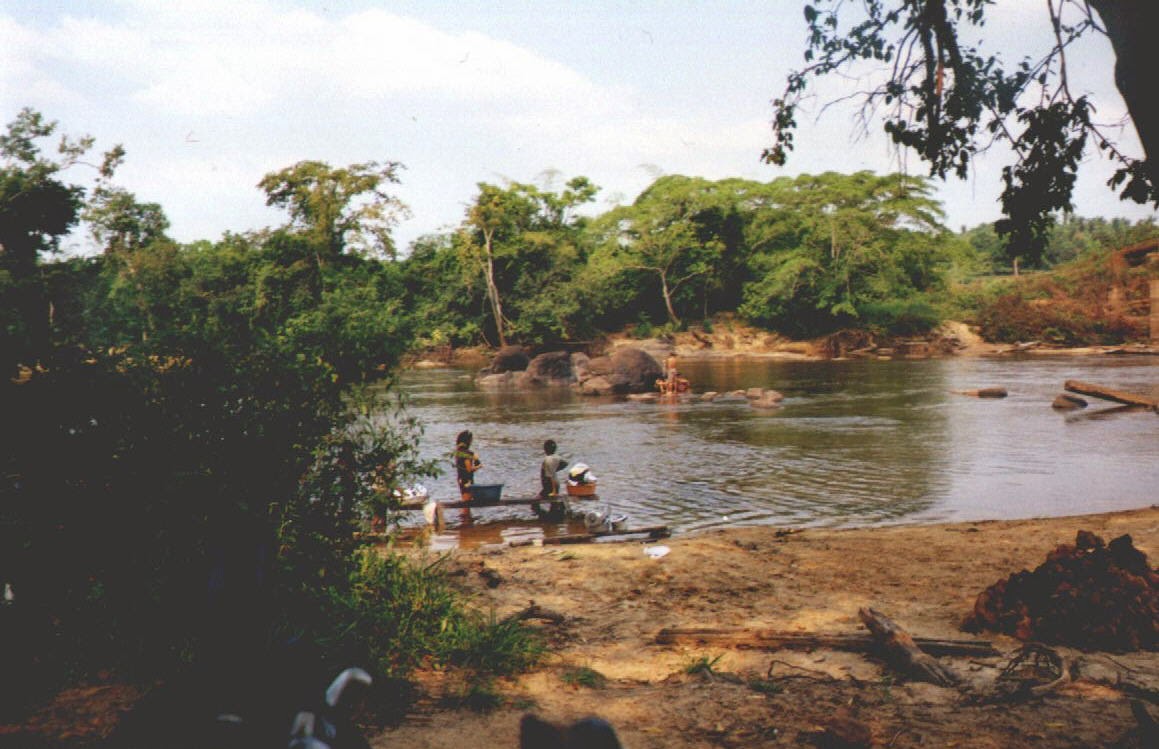
Rivers and lakes were available whenever I needed
one, and I had a swim at least once an hour... I
usually preferred the places used by the locals, as I
don't know much about the dangerous beasts in there,
such as Jacaré (Amazonian alligator), Puraque (Electric Eel), Piranha and
lots more.
Once I cycled for a long time without passing houses.
I crossed one of these funny wooden bridges,
masterpieces of architecture where you never know if
you reach the other side alive. I stopped there, sat
down on the bridge with my feet bouncing down and just
asking myself if it would be safe to swim here when
I saw the two eyes staring at me: a big Jacaré, waiting for lunch...
I then didn't even dare to fill my water bottles, with
this scene of "Crocodile Dundee" in mind...
Night falls fast in the tropics. Within 5 minutes it's
completely dark, so you have to keep an eye at your
watch in the late afternoon. Instead of sleeping
somewhere in the forest I now often pulled into one
of these small farms to ask permission to camp on
their ground, and I was never sent away. I was ALWAYS
invited to come in, to have dinner with them and often
I was even offered a place to sleep indoors. I
preferred to sleep outside in my tent instead of
pushing the kids out of their bed, but I gladly
accepted the dinner, which was simple, but still better
than the rice with tomato soup I had with me to
prepare on my stove. (I 'paid' the food by
distributing cookies and chocolate to the kids.) The
houses had usually no electricity. A small candle was
the only light and water was picked up at the next river.
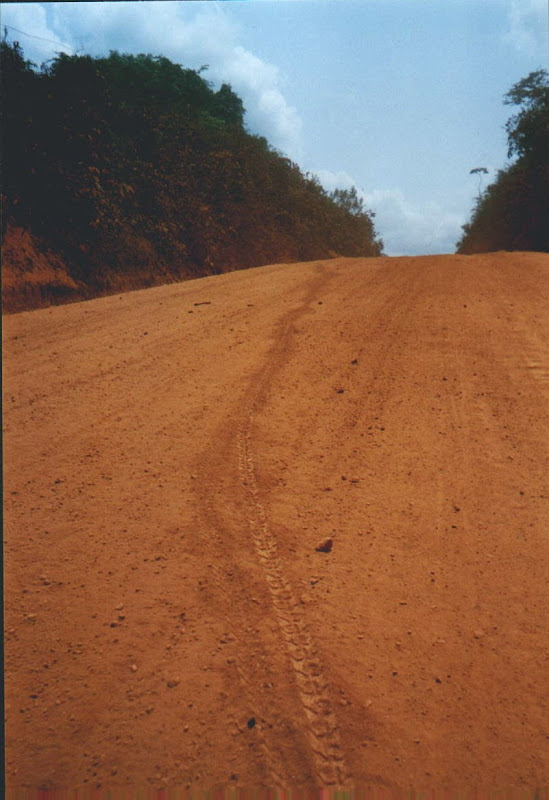
Road conditions worsened with every kilometer. The
problem was not that much the holes, stones and rocks
on the road. These were usually easy to avoid on two
wheels. The problem was the dust. Long stretches of the
road were covered with several centimeters of dust,
fine powder that spreads away like water when you
pass through. It entered everywhere, in each pannier,
in every plastic bag, into my food and into my lungs.
Together with the oil and grease it formed a perfect
grinding paste on the chain. The main problem was that
it formed a smooth surface, so I couldn't see the
rocks and potholes underneath. And I think I
don't need to explain what happened when a truck passed by....
Well, finally I reached the Xingu River, and some hours
later Altamira, the only town that rewards this name since I left
Tucurui.
The Xingu River is very beautiful. Clean water and -
at least at this time of the year - wide sandy
beaches. It is known for it's native population, with
one of the few Indian tribes in Brazil that
successfully preserves its own culture, and successfully
claims its rights from the Brazilian government.
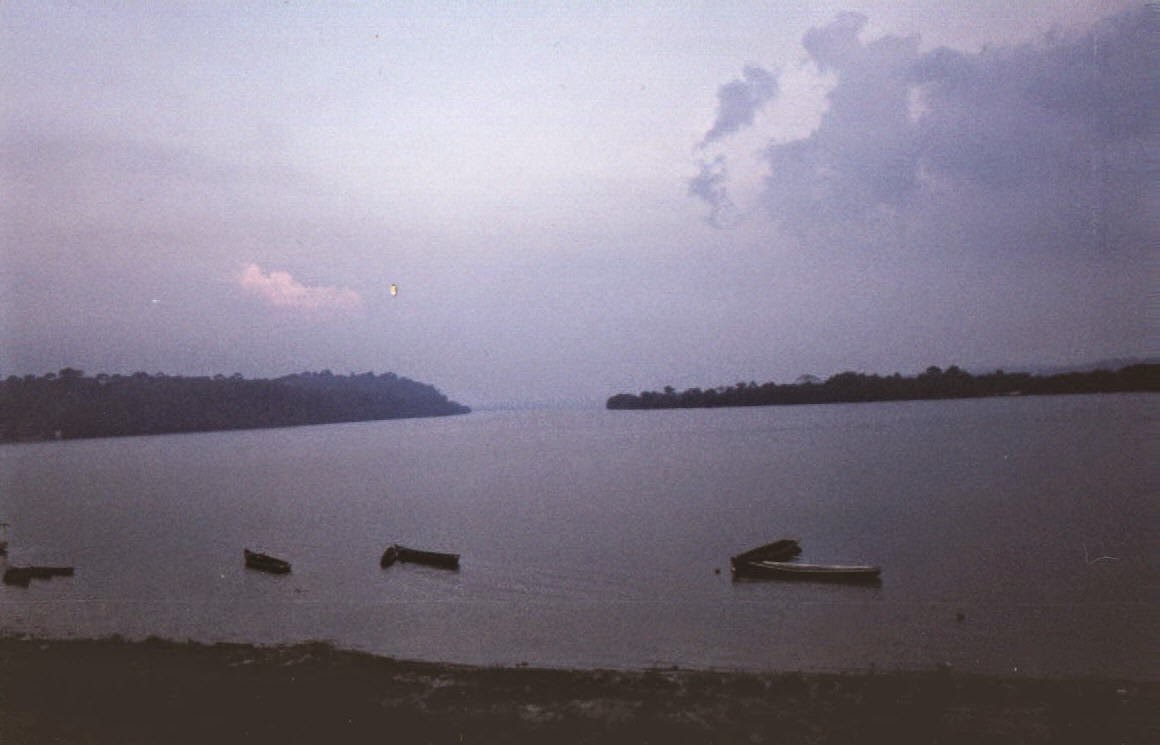
Here in Altamira is an outpost of the "FUNAI", the
Indian administration office, which is frequented by
the natives dealing with bureaucracy or seeking health
care. I found them very fascinating. They walk around
in town like everyone else, go shopping and use buses
and taxis, but they walk around just in shorts, the
body covered with tattoos and paintings, and spears,
bows and poisoned arrows under their arms!! I had a short chat
with one of them, but I didn't dare to ask permission
to take a picture. When they finish their business
in town they go back to their villages along the
river, and while unsuccessfully searching for an Internet access I was
wondering if these guys need to care that much
about computers and the Y2K-bug...
Well, this was Rio Tocantins to Rio Xingu. Next part
is Rio Xingu to Rio Tapajós, 500 kilometers, where I
reach the next town of notable size, Itaituba.
Até logo
Micha
<-- continue part 3
